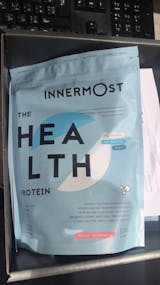Eggs are one of nature’s best sources of protein and natural nutrients. Versatile, delicious and affordable, eggs can be enjoyed in a number of ways, and are a great way to up the nutrition content of a meal.
Egg whites have made their way onto many a breakfast menu in the form of an egg-white omelette or (for a slightly more unhealthy option) onto our dessert menus in the form of light, crispy meringues. Yum. If you're looking to consume a whole-food source of protein with few calories, it's pretty hard to beat egg whites.
Whole eggs, on the other hand, contain a considerable range of nutrients that come with the egg yolks, including antioxidant properties, vitamins and amino acids. Whether you eat your whole eggs boiled, poached, scrambled or baked, this food staple contains very few calories, but plenty of benefits.
But, which is better? Innermost investigates. Without further ado, let's put the egg yolk vs egg whites information to the test.
Are eggs nutritious?
The short answer? Yes.
The question is, however, how nutritious? And, which part of the egg is better for you? We dive into the ins-and-outs below to find your winner and answer the age old debate once and for all.
How many calories are in egg whites and egg yolks?
Whilst eggs are considered a pretty healthy snack, the amount of calories that you consume depends entirely on the size and prep of the egg - aka, are you tucking into a classic scrambled eggs on toast kind of meal, or adding a couple of boiled eggs to your salad?
If we are considering the number of calories in your average egg, overall, there are around 60-80, depending on the size. Egg whites have next to no calories, whereas an average egg yolk contains around 50 of those.
We have a clear winner here. Next up, protein levels...
How much protein are in egg whites and egg yolks?
You may be surprised: half of all protein found in an egg is actually found in the egg whites. To put this into context, in one average sized egg, you would consume around 6g of protein. Around 3g of that is found in the egg whites themselves. These egg whites, sometimes referred to by the "Albumen", is formed as a protective barrier around the egg yolk - whether this yolk is fertilised or not.
What about protein absorption?
Whole eggs are still a very low-calorie food, despite the fact that they contain more calories from fat than they do from protein. Remember, dietary fats slow protein absorption, allowing it to stay with you for longer.
Whole eggs also have a better amino acid profile to support lean muscle growth. So, if your goal is to get protein quickly into your system, egg whites may be the better option, but at all other times of day, whole eggs are the way to go.
Next time, think twice before you throw away the yolk. Enjoy them instead and your body will thank you for it.
What nutrients are found in egg whites and egg yolks?
In further support of the goodness of the egg yolk, almost all of the nutrients in an egg are found in the yolk - containing vitamins and minerals such:
- Vitamin B6
- Calcium
- Folate
- Vitamin A
- Vitamin D
- Vitamin E
- Vitamin K
- Essential omega-3 fatty acids
In addition to this, egg yolks contain compounds that can help with eye, brain and cardiovascular health and also reduce inflammation. Not so intent on throwing away that yolk now, right?
What are the levels of cholesterol found in egg whites and egg yolks?
Similarly to the calorie profile of the egg, it is the humble egg white that comes out on top. Egg yolks contain a far greater cholesterol level.
As egg yolks also contain all the cholesterol of the overall egg, it was thought that cutting them out would be a good thing. But, this seems to have been the wrong thing to do based on recent research, which shows that people who ate three eggs per day for 12 weeks showed no significant increase in their bad cholesterol.
Our bodies produce cholesterol naturally as it’s essential for our cells. When we eat cholesterol, our bodies adjust and produce less to balance out our intake. So, unless you have familial hypercholesterolemia, which is a very rare condition, throwing away the egg yolk in an attempt to reduce our cholesterol levels isn’t the right thing to do.
Summary
So, are egg whites healthy? Yes. Are egg yolks healthy? Also yes. Whilst egg whites contain less calories, egg yolks carry a huge wealth of nutrients, so please don't avoid them! The truth is, eggs are pretty much one of the healthiest foods you can eat, so incorporate them where you can! Salads, pastas, breakfasts - you name it, we're sure you can incorporate it.
If you're not a fan of eggs but want to harbour some of these benefits, why not try incorporating The Lean Protein into your daily routine? Packed with energy-boosting benefits and natural flavours, this whey protein is the perfect on-the-go protein source and a great alternative.
References
- Bilsborough, S., & Mann, N. (2006). A review of issues of dietary protein intake in humans. International journal of sport nutrition and exercise metabolism, 16(2), 129-152. Click here.
- Fenton, M., & Sim, J. S. (1991). Determination of egg yolk cholesterol content by on-column capillary gas chromatography. Journal of Chromatography A, 540, 323-329. Click here.
























